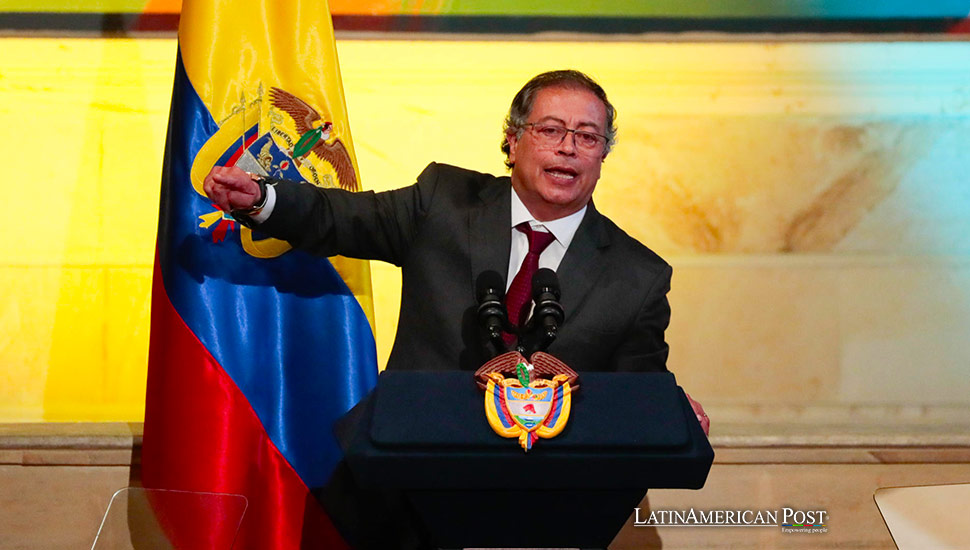Colombia’s President Advocates for Health and Labor Reforms at Congressional Opening

Colombia’s President Gustavo Petro is on a mission to overhaul the health sector and implement significant labor law changes as he enters the second half of his term. These reforms, crucial for the country’s future, face legislative challenges amid political shifts and corruption scandals.
As Colombia’s Congress convened for a new session, President Gustavo Petro announced his administration’s intent to propose sweeping reforms in the health and labor sectors. Petro, Colombia’s first left-wing president, has advocated for ambitious economic changes, including revamping the pension system, increasing the minimum wage, and redistributing land to farmers affected by the country’s long-standing armed conflict.
Petro succeeded in raising the minimum wage last year and securing congressional approval for his pension reform earlier this year. However, he has encountered significant resistance from legislators concerning his labor laws and health system reform proposals.
Petro’s efforts to enact his reforms are complicated by the fragmentation of the political coalition that initially supported his government. Ideological differences led to the breakup of this coalition, leaving Petro’s administration without a clear majority in Congress. Additionally, several corruption scandals involving government ministers and the president’s eldest son have further eroded his popularity and political support.
Despite leftist parties holding the highest number of legislative seats in Colombia’s history, they still lack the 50% majority to pass legislation independently. This situation has forced Petro’s government to negotiate with centrist and right-leaning parties to advance his legislative agenda.
Proposed Health Care Reform
A cornerstone of Petro’s reform agenda is overhauling Colombia’s health care system. By shifting the responsibility of managing insurance fees to a government agency, Petro aims to streamline the healthcare system, reduce inefficiencies, and ensure equitable access to medical services for all Colombians, a promising step towards a healthier nation.
However, this proposal has faced substantial opposition from private insurance companies and their political allies, who argue that such a centralization could lead to bureaucratic inefficiencies and reduced quality of care. On the other hand, proponents of the reform emphasize the need for a more integrated and accountable system that prioritizes public health over private profit. They argue that a centralized system could lead to more equitable access to healthcare and potentially lower costs for patients.
Labor Law Overhaul
In addition to health care reform, Petro is also pushing for significant changes in labor laws. One of his key proposals is to make it more difficult for companies to hire workers on temporary contracts, aiming to provide greater job security and employee benefits. He also advocates requiring employers to pay workers total wages on rest days, arguing that this would enhance workers’ rights and improve their quality of life. These changes could significantly improve the working conditions and quality of life for many Colombians.
Furthermore, Petro proposed reducing the work week from 47 hours to 40, suggesting that this change could boost employment and spur productivity. He contends that a shorter workweek would allow workers more time for rest and personal development, potentially leading to a more motivated and efficient workforce.
In his address to Congress, Petro highlighted the positive impact of last year’s 16% minimum wage increase, which contributed to a 10% reduction in poverty in 2023, bringing poverty levels back to those seen in 2019. This significant reduction in poverty demonstrates the administration’s commitment to reducing inequality and promoting economic equity. Petro asserted, emphasizing his administration’s commitment to social justice and economic equity.
Economic and Peace Deal Priorities
As he approaches the halfway mark of his four-year term, which ends in August 2026, Petro faces criticism over his administration’s handling of inflation and tax collection. In response, he urged Colombia’s central bank to lower interest rates to stimulate economic growth. He also suggested that Congress could help curb inflation by controlling speculation in real estate rentals and reining in electricity fees, measures aimed at alleviating the financial burden on ordinary Colombians.
Petro also announced plans to introduce a bill that would expedite congressional approval of legislation related to the 2016 peace deal with the Revolutionary Armed Forces of Colombia (FARC). He acknowledged that the accord’s implementation needs to catch up, particularly in land distribution and economic development projects for rural communities. Accelerating the legislative process for peace deal-related measures is essential to addressing Colombia’s conflict’s root causes and fostering long-term stability.
However, critics have expressed concerns about these efforts to fast-track legislation. They argue that such mechanisms could be exploited to concentrate power in the president’s hands and potentially eliminate term limits, undermining democratic checks and balances. These apprehensions reflect broader fears about the potential for authoritarianism under a leftist administration, even as Petro insists that his reforms promote democracy and social justice.
Navigating Legislative Hurdles
President Gustavo Petro’s ambitious agenda for health and labor reforms underscores his commitment to addressing deep-seated inequalities in Colombia. However, the path to achieving these reforms is fraught with political challenges and resistance from entrenched interests.
The breakup of the initial coalition supporting his government, coupled with corruption scandals, has weakened Petro’s position in Congress. To pass his proposed legislation, he must navigate a complex political landscape, seeking support from centrist and right-leaning parties while maintaining the backing of his leftist base.
Also read: Salvatore Mancuso Released: Colombia’s Complex Path to Justice and Reconciliation
As Petro strives to implement his vision for a more equitable Colombia, the success of his reforms will depend on his ability to build broad-based coalitions and address legitimate concerns about the concentration of power. The outcome of these efforts will have profound implications for the future of Colombia’s democracy and its capacity to achieve lasting peace and social justice.




